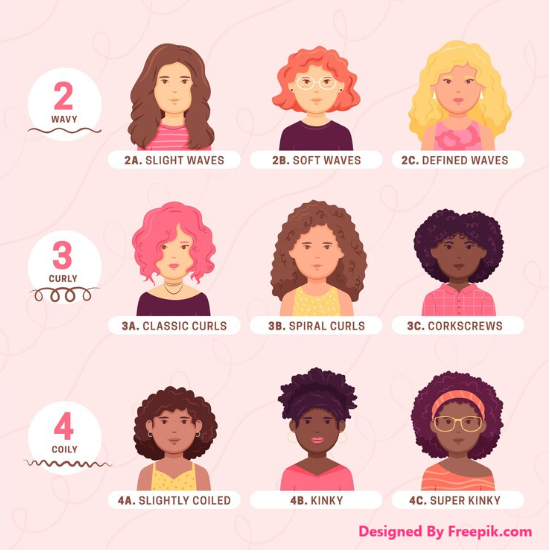Understanding the different types of curly hair can help you better care for and style your hair. Curly hair is one of the most unique and versatile hair types with various textures and patterns that can range from loose waves to tight coils. In this article, we will explore the various types of curly hair from Type 2 to Type 4 and provide insights on how to embrace and enhance your natural curls.
Table of Contents
Types of Curly Hair:
The various types of curly hair are as follow:
a. Type 2: Wavy Hair
The texture of Type 2 hair is characterized by S-shaped or loosely spiraled strands that create waves throughout the hair shaft. These waves can vary in size and shape depending on factors such as genetics, hair care practices and environmental conditions. Wavy hair are the types of curly hair that falls somewhere between straight and curly. This hair type is usually easy to style and can hold a range of different looks. Wavy hair often has a natural bounce and movement to it lending it a relaxed and effortlessly chic appearance. Popular techniques for styling Type 2 hair include scrunching, diffusing and braiding for loose, beachy waves.
Type 2 Hair Care Tips:
Wavy hair tends to be fine to medium in texture and may become weighed down by heavy products. To care for wavy hair use lightweight, hydrating products that enhance wave definition without causing buildup. Incorporating a weekly deep conditioning treatment can help nourish and strengthen wavy hair promoting healthy growth and shine.
b. Type 3: Curly Hair
Type 3 hair is characterized by its spiral or ringlet-shaped strands which form natural curls throughout the hair shaft. This types of curly hair ranges from loose curls to tight coil with variations in curl pattern, size and density depending on factors such as genetics, ethnicity and hair care practices. Curly hair tends to be drier than straight or wavy hair because the natural oils produced by the scalp have a harder time travelling down the spiral-shaped strands. This can lead to challenges such as frizz, tangles and breakage if not properly cared for.
Despite these challenges, curly hair offers a unique and beautiful aesthetic often associated with volume, bounce and texture. Curls can range from soft, beachy waves to tight, springy coils providing versatility in styling options. Protective styles like twist-outs, bantu knots and braid-outs can help maintain the curl pattern and reduce breakage.
Type 3 Hair Care Tips:
Curly hair is thicker in texture compared to wavy hair and requires regular moisturization to prevent dryness and frizz. Always try to use hydrating shampoos and conditioners formulated specifically for curly hair types. Additionally, using a leave-in conditioner or curl cream can help define curls and combat frizz resulting in soft and manageable hair.
c. Type 4: Coily Hair
Type 4 hair are coily hair also known as kinky or tightly coiled hair. They are characterized by their tight, spiral-shaped strands that form dense and springy coils. This hair texture is commonly found in individuals of African descent, though it can occur in people of other ethnicities as well. Coily hair typically has a high density meaning that there are many hair strands packed closely together on the scalp.
The curl pattern of coily hair can vary widely ranging from small, tight coils to larger and looser coils. This diversity adds to the beauty and uniqueness of coily hair offering a wide range of styling possibilities. Coily hair tends to be fragile and prone to dryness because the natural oils produced by the scalp have difficulty travelling down the tightly coiled strands. Protective styles like twist braids, cornrows and bantu knots can help protect the delicate coils and promote healthy growth.
Type 4 Hair Care Tips:
Coily hair has a dense texture and requires frequent moisturization to maintain its shape and elasticity. As a result, moisture retention is key to maintaining healthy coily hair as it helps prevent breakage and frizz. Use moisturizing shampoos and conditioners that penetrate deeply into the hair shaft to provide ample hydration. Incorporating oils such as coconut or argan oil into your hair care routine can help seal in moisture and prevent breakage, leaving coily hair soft and supple.

In summary, each type from the types of curly hair has its own unique characteristics and care requirements. By understanding your hair type and embracing its natural texture, you can confidently rock your curls and showcase your individual style. Whether you have wavy, curly or coily hair remember to nourish and protect your locks to keep them healthy and vibrant. For further details on the curly hair care routine of visit our article Curly Hair Care.

